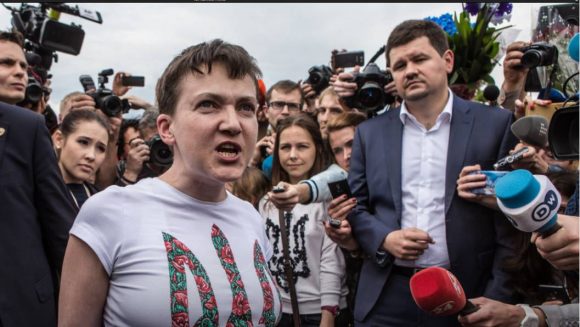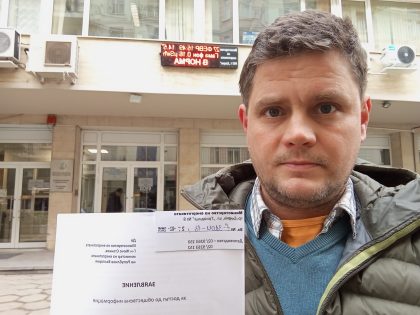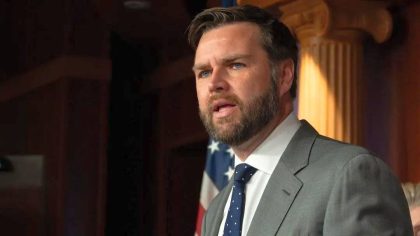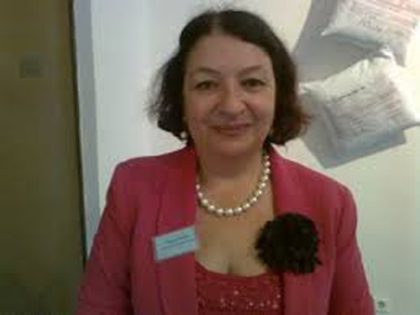Once hailed for her resistance in a Russian court, the Ukrainian now stands accused of plotting a coup

By James Marson
KIEV, Ukraine—Hunched on a sofa opposite two Ukrainian special-forces soldiers, the short-haired woman made her pitch in a quiet, steady voice.
“I am proposing a coup,” she said in an exchange caught on a hidden camera in December. As for Ukraine’s leaders, “we need to remove them physically, all in one go,” she said.
The woman was Nadiya Savchenko, a lawmaker, former soldier and hero of the country’s conflict with Russia. Her saga shows how this troubled country, more than four years into a confrontation with Moscow, has become a political hall of mirrors, rife with suspicion, paranoia and uncertainty.
She was captured by Russia-backed separatists in eastern Ukraine in 2014, put on trial in Russia for abetting murder, and convicted. Ukraine rejoiced when she was freed in a prisoner exchange in 2016. Now, in a twist that has stunned the nation, she is under arrest in a Ukrainian jail for allegedly plotting a bloody coup.
Ms. Savchenko said she invented the plot as a “political provocation” to shame the government, which she accuses of corruption and failing to end the war. Prosecutors and pro-Western lawmakers say Ms. Savchenko, wittingly or not, became a tool of her former jailers in the Kremlin, which is waging a campaign on many fronts against Ukraine’s efforts to wriggle free from its former Soviet master.
Prosecutors say Ms. Savchenko and an alleged accomplice received weapons, including mortars and rifles, from separatist army bases controlled by Russian officers, and that the alleged coup plotters are linked to a Ukrainian politician who is close to Russian President Vladimir Putin.
“The army prevented the military defeat of our country,” General Prosecutor Yuriy Lutsenko told parliament in March before lawmakers approved his request to remove the immunity from prosecution Ms. Savchenko enjoyed as a member of parliament. “The aggressor is focused on destroying Ukraine from the inside.”
Russia says Ukraine is part of its sphere of influence. After street protests led to the ouster of a pro-Russian president in 2014, the Kremlin annexed Crimea, fomented a rebellion in Ukraine’s east and covertly sent military units across the border. The front line of that conflict is more or less frozen. Ukrainian officials say the Kremlin has tried to destabilize the rest of Ukraine through measures including cyberattacks, assassinations and terrorist attacks, and funding to media and antigovernment agitators.
Russia denies any involvement, including inciting the rebellion. It cites the tumult to portray Ukraine’s government as an incompetent and untrustworthy mess.
The West, meanwhile, has poured billions of dollars into Ukraine to stabilize its finances, encouraged it to overhaul its weak and corruption-ridden economy, and provided training and weapons to its army. Critics at home and in Western capitals say the government’s halfhearted efforts to tackle malfeasance and economic inequality have deepened Ukraine’s vulnerability. Approval for the president and parliament are low, and many distrust the motives of political leaders and law enforcers in Ukraine who are widely reviled as corrupt and ineffective.
Russia and some Ukrainian government critics suggest the authorities are using exaggerated claims and manufactured plots to boost their own image, including in the Savchenko case. In May, Ukraine faked the death of a dissident Russian journalist in what officials said was a ruse aimed at discovering who was behind a Russian plot they had uncovered on his life.
Ms. Savchenko’s sister, Vira, said in an interview that Nadiya was a victim of a government plot to eliminate an opponent who couldn’t be co-opted. “They needed to get rid of Nadiya, and the most effective way was using the image of terrorism for the West,” she said.
Ms. Savchenko has tried to make light of her own situation, releasing a short video clip in which she appears with parliament in the background and says: “Kaboom! Aren’t you scared?” She told lawmakers at a meeting she had brought along grenades, then pulled two pomegranates from her bag—the word for the fruit and the weapon is the same in Ukrainian—and placed them on a table.
Former comrades-in-arms are torn over what to believe. “Lots think it must be made up; others say she was sick in the head,” says Vitaliy Derekh, a 30-year-old firefighter who fought in the same volunteer unit as Ms. Savchenko. “No one really knows what happened.”
Ms. Savchenko, 37 years old, has spent her life challenging authority. Born in Kiev, she overcame societal resistance to serve as an officer in the army, training as a fighter pilot and later becoming a helicopter navigator.
In 2014, she joined street protests in Kiev against a pro-Russian president. After he fled, and Russia whipped up a separatist insurgency, Ms. Savchenko took leave from her army unit and joined a pro-government militia. She took the nom de guerre “Bullet” and impressed comrades as a leader at a time when Ukraine’s military efforts were in chaos.
“She was always confident in what she was doing,” says Mr. Derekh, a volunteer from the militia, known as Aidar.
Ms. Savchenko was seized during a battle with separatists that summer. Oleksandr Aliyev, a volunteer fighter who was incarcerated at the same time, said he and several others were freed with the help of Volodymyr Ruban, who later made a name for himself for negotiating prisoner exchanges as head of a nongovernmental organization called Officer Corps.
Ms. Savchenko was taken across the border into Russia and put on trial for abetting the murder of two Russian journalists who died in a mortar attack. Prosecutors said she guided that attack. Denying the charge, she went on a hunger strike, sparred with the judge and flaunted her patriotism by wearing a T-shirt emblazoned with a trident, Ukraine’s national symbol.
The televised trial captivated Ukraine, where her bluntness and refusal to bend to Russian authority contrasted to Kiev’s at times weak and muddled response to Russia’s interventions.
Ukrainian President Petro Poroshenko made Ms. Savchenko a Hero of Ukraine, the country’s highest accolade. Ukraine’s postal service issued a stamp with her portrait. She was elected to parliament as the lead candidate for a pro-Western political party called Fatherland.
“She behaved bravely. She became a symbol,” says Oleksiy Ryabchyn, a Fatherland lawmaker who traveled to Russia to support her.
Ms. Savchenko was convicted in March 2016 and sentenced to 22 years in prison. Amid international pressure for her release, she was swapped two months later for two Russian intelligence officers caught by Ukraine on its territory. Mr. Putin portrayed the deal as arranged by Viktor Medvedchuk, a veteran Ukrainian politician who is personally close to the Russian president.
Ms. Savchenko returned to Kiev on the Ukrainian presidential plane, downing shots of vodka as it left Russian airspace, according to a person present. Politicians jockeyed to be seen with her after she descended from the plane barefoot and gave impassioned speeches. “I serve the people of Ukraine!” she declared as she stood next to the president.
She soon turned her sharp tongue on Ukraine’s government and lawmakers, whom she accused of failing to end the war and betraying the promise of the 2014 revolution to weed out corruption.
Mr. Ryabchyn, the lawmaker, says he was troubled by a meeting with her a few months after she was freed, where she spoke about a radical approach to overhauling the country. “She wanted to eliminate old, corrupted institutions and start from scratch,” he recalls.
Her words resonated with Ukrainians disappointed with the lack of progress. Yet some allies were concerned her message was echoing the Kremlin’s. She became a frequent guest on a television channel owned by a pro-Russian lawmaker.
In December 2016, Ms. Savchenko met two separatist chiefs. “I sat at a table with people with whom we exchanged fire, and I didn’t see the devil in them,” she told reporters after the meeting. “If we want peace, we need to start talking.”
After that meeting, she split with the pro-Western Fatherland party.
“Savchenko is a Hero of Ukraine, but she is saying these pro-Russian things,” says Mr. Ryabchyn. “She was a propaganda soldier” for Russia.
Former comrades-in-arms began to reassess her actions and the fame she garnered during the trial, which was covered extensively on Russian television channels.
“Russian TV made her a star,” says Ihor Lapin, a lawmaker who served in the same militia as Ms. Savchenko. “Now pro-Russian television supported her.”
Mr. Lutsenko, the prosecutor, said he heard last summer Ms. Savchenko had spoken with a Ukrainian officer about overthrowing the government, but dismissed it as radical prattle. Then she approached a second officer from special forces in a cafe near the eastern city of Kharkiv, Mr. Lutsenko said. The officer recorded the meeting on his watch and complained to his unit’s counterintelligence officer about what he assumed was a test. Not to my knowledge, replied the counterintelligence officer.
Ms. Savchenko and her alleged co-conspirator then gave the officer $8,500 to buy a van to bring weapons from separatist-held territory, Mr. Lutsenko said. The officer took the money and informed the Security Services of Ukraine, called the SBU, which told him to play along. Her alleged co-plotter was Mr. Ruban, the negotiator of prisoner swaps.
In November, Ms. Savchenko and Mr. Ruban traveled to meet separatists and picked up a stock of weapons, prosecutors say. At a meeting that month with special-forces soldiers posing as co-conspirators, Ms. Savchenko can be heard on a secret recording describing a meeting with pro-Russian separatist leaders. “Their request is to change the government,” she said.
Ms. Savchenko and Mr. Ruban turned over the van to special-forces soldiers, who drove the weapons to Kiev to be checked by the SBU, then to the base of the special-forces soldiers. According to Mr. Lutsenko, Mr. Ruban and Ms. Savchenko visited the base in early December and described their proposals for a terrorist attack and coup, including mortar strikes on the government district in Kiev. Ms. Savchenko described how she could carry out a grenade attack when the country’s leadership was in parliament for the president’s annual address. “I’ll do it myself from inside,” she said on the secretly recorded video.
The video Mr. Lutsenko played in parliament shows Mr. Ruban and Ms. Savchenko testing the sniper rifle on the shooting range at the base.
The SBU fitted the van with video surveillance, which captured Mr. Ruban heading to separatist-held territories again in March, where he picked up more weapons from bases commanded by Russian officers, Mr. Lutsenko said.
On March 8, Mr. Ruban was detained as he crossed back into government-controlled territory, and the weapons were found hidden in furniture in his van, prosecutors say. He denied wrongdoing in a pretrial court hearing in March, saying he had been set up.
Mr. Lutsenko applied to a parliamentary committee to start the process of removing Ms. Savchenko’s immunity from prosecution.
At a televised hearing, she said she had been aware of the surveillance and decided to “paint nonsense” to frighten the government, with no intention of attempting a coup.
“Every Ukrainian dreams of parliament blowing up, but you can’t go to jail for dreams,” Ms. Savchenko said.
A week later, Mr. Lutsenko presented the video in parliament. Lawmakers, including some usually skeptical of government motives, voted to remove her immunity and allow her arrest. As the prosecutor pledged to find the “puppeteer” behind the plot, lawmakers chanted the name of Mr. Medvedchuk, the head of a pro-Russian group called Ukrainian Choice who is close to Mr. Putin.
Mr. Lutsenko has said investigators are looking into Mr. Medvedchuk’s potential “anti-Ukrainian activity,” including any possible connection to Ms. Savchenko alleged plot. Mr. Medvedchuk has rejected the accusations. He didn’t respond to questions sent to him in connection with this article.
At a news conference earlier this month, Mr. Lutsenko said the investigation is complete and that the accused and their lawyers are studying the case materials ahead of a trial, which could start this year.
After a court confirmed Ms. Savchenko’s arrest at the end of March, a video appeared on her Facebook page, showing her changing out of a traditional Ukrainian embroidered shirt into fatigues and pledging to run for president.
“It is a boon for Russia, whether the terror attack succeeded or not,” says Mr. Lapin, Ms. Savchenko’s former comrade-in-arms. “She was a great martyr [for Ukraine] in Russia, and now Ukraine locked her up.”
Write to James Marson at james.marson@wsj.com
More info: www.wsj.com
.






